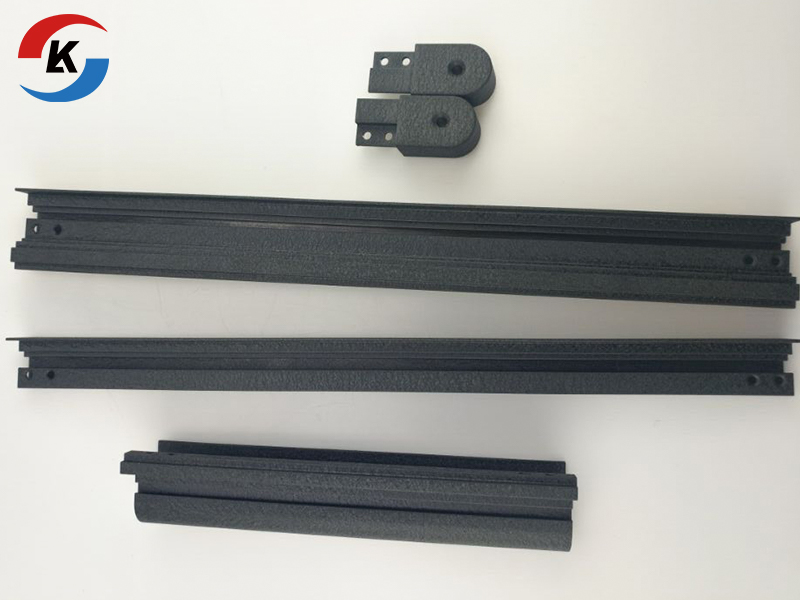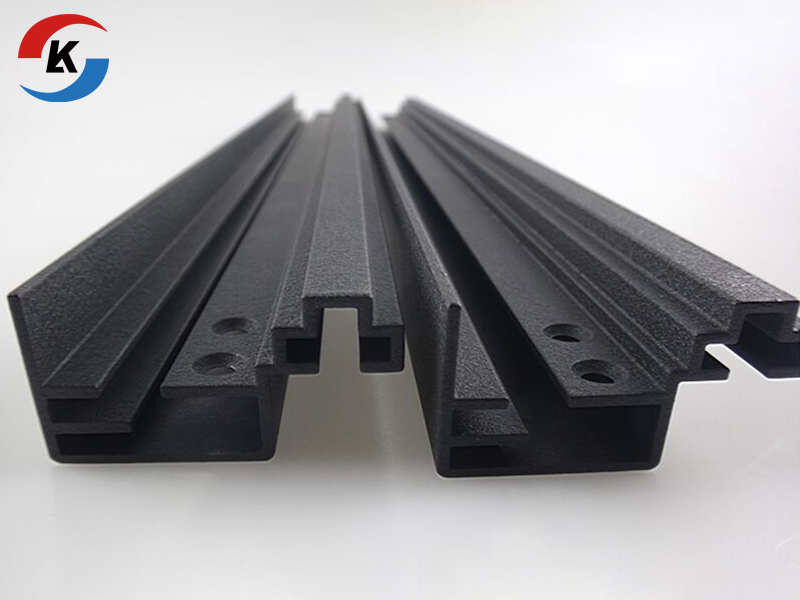Aluminum Sheet Metal Fabrication
The Advantages of Using Aluminum in Sheet Metal Fabrication
Aluminum stands as a favored material in the world of sheet metal fabrication, prized for its combination of advantageous properties and versatility. Here's an insight into why aluminum is so prevalent in this field:
Lightweight: Aluminum's low density makes it an excellent choice for applications where weight reduction is essential without sacrificing strength.
Corrosion Resistance: Naturally resistant to corrosion, aluminum is ideal for use in environments where exposure to the elements is a concern.
Cost-Effectiveness: The affordability of aluminum, coupled with its durability, makes it a cost-effective option for both small-scale and large-scale projects.
Diverse Grades Available: With a variety of aluminum grades to choose from, fabricators can select the most appropriate type to suit specific application requirements.


The Advantages of Using Aluminum in Sheet Metal Fabrication
Aluminum stands as a favored material in the world of sheet metal fabrication, prized for its combination of advantageous properties and versatility. Here's an insight into why aluminum is so prevalent in this field:
Lightweight: Aluminum's low density makes it an excellent choice for applications where weight reduction is essential without sacrificing strength.
Corrosion Resistance: Naturally resistant to corrosion, aluminum is ideal for use in environments where exposure to the elements is a concern.
Cost-Effectiveness: The affordability of aluminum, coupled with its durability, makes it a cost-effective option for both small-scale and large-scale projects.
Diverse Grades Available: With a variety of aluminum grades to choose from, fabricators can select the most appropriate type to suit specific application requirements.

Aluminum sheet metal fabrication is the process of transforming a piece of aluminum sheet into a part or product through various methods of material removal or deformation. This includes common fabrication techniques such as cutting, welding, forming, bending, and joining. The choice of technique is determined by the specific needs of the application at hand.
The characteristics of aluminum sheet metal parts make them highly sought after across numerous industries, including aerospace, automotive, and food. Forming and cutting are typically essential steps in the fabrication process of aluminum sheet metal, ensuring the material is precisely shaped to meet the exact specifications of each project.
The use of aluminum in sheet metal fabrication continues to grow due to its adaptability and the high-quality results it produces. Whether for structural components, decorative elements, or functional hardware, aluminum's properties make it an invaluable resource in the manufacturing landscape.
Aluminum sheet metal fabrication is the process of transforming a piece of aluminum sheet into a part or product through various methods of material removal or deformation. This includes common fabrication techniques such as cutting, welding, forming, bending, and joining. The choice of technique is determined by the specific needs of the application at hand.
The characteristics of aluminum sheet metal parts make them highly sought after across numerous industries, including aerospace, automotive, and food. Forming and cutting are typically essential steps in the fabrication process of aluminum sheet metal, ensuring the material is precisely shaped to meet the exact specifications of each project.
The use of aluminum in sheet metal fabrication continues to grow due to its adaptability and the high-quality results it produces. Whether for structural components, decorative elements, or functional hardware, aluminum's properties make it an invaluable resource in the manufacturing landscape.


The Key Benefits of Opting for Aluminum Sheet Metal Fabrication
Aluminum sheet metal fabrication offers a plethora of benefits that make it an attractive option for a variety of projects. Here are the primary advantages of using aluminum for sheet metal parts:
Weight Reduction: Aluminum parts can replace heavier materials in applications where reducing weight is crucial, without compromising on strength or durability.
Outstanding Durability: Aluminum boasts high resistance to environmental factors such as corrosion, heat, and rust, as well as general wear and tear, making it suitable for both indoor and outdoor applications.
Cost-Effectiveness: As a material, aluminum presents a cost-effective solution for sheet metal fabrication, offering excellent value for its properties.

Navigating the Most Common Aluminum Grades in Sheet Metal Fabrication
In the realm of sheet metal fabrication, aluminum is highly favored for its blend of strength, workability, and corrosion resistance. However, selecting the appropriate grade of aluminum is crucial to ensure the best results for your project. Here are some of the most commonly used aluminum grades in sheet metal fabrication:
1100 Aluminum: Known for its excellent ductility, corrosion resistance, and workability, 1100 is a pure aluminum alloy that is commonly used in applications requiring intricate forming.
3003 Aluminum: This alloy is a blend of aluminum with manganese, known for its good weldability, corrosion resistance, and higher strength compared to 1100 aluminum. It's ideal for parts that require moderate strength and good formability.
Navigating the Most Common Aluminum Grades in Sheet Metal Fabrication
Versatile Formability: The malleability of aluminum sheet metal allows it to be cut, bent, stretched, or rolled into nearly any shape required, providing tremendous design flexibility.
Longevity: Fabricated aluminum parts are known for maintaining their shape and integrity over many years, even under stress or in varying environmental conditions.
These benefits underscore why aluminum sheet metal is a popular choice among manufacturers and designers. Its combination of lightness, strength, and malleability, along with its cost advantages, make aluminum an excellent choice for a wide range of fabrication projects. Whether for complex machinery, architectural structures, or lightweight automotive components, aluminum sheet metal stands out as a reliable and versatile material.


5052 Aluminum: With its addition of magnesium, 5052 aluminum offers superior corrosion resistance and higher strength than both 1100 and 3003 alloys. It's well-suited for environments exposed to saltwater or chemicals.
6061 Aluminum: This grade combines aluminum with magnesium and silicon, resulting in an alloy that's easy to machine and weld. It's known for its structural strength, making it a preferred choice for fabrication projects that demand toughness.
7075 Aluminum: One of the strongest aluminum alloys available, 7075 includes zinc as its primary alloying element. It's commonly used in applications that require high stress and strain resistance.
Each of these aluminum grades has distinct characteristics that make them suitable for specific sheet metal fabrication needs. Understanding the properties and capabilities of these alloys allows manufacturers to select the optimal aluminum grade that will deliver durability, workability, and performance for their specific application.
Selecting from a Variety of Aluminum Alloys for Diverse Fabrication Needs
The range of aluminum alloys available in the market allows for tailored solutions in fabrication projects. Here's a closer look at some of the key aluminum grades and their applications:
Aluminum 6061 (T6): As a heat-treated structural aluminum alloy, 6061 is particularly well-suited for aviation applications. The commonly chosen variant, 6061-T651, offers a good balance of strength, toughness, and corrosion resistance. While not as formable or weldable as other grades, it is frequently used in the construction of boats, automobile components, and bicycles.
Aluminum 5052 (H32): This alloy, while stronger than 6061, maintains excellent weldability, corrosion resistance, and formability. Its strength and durability make it ideal for fabricating tanks or chassis for vehicles and equipment.


Premier Aluminum Sheet Metal Fabrication Services for Custom Parts
For projects in need of aluminum sheet metal fabricated parts, LK tools stands out as a reliable and skilled provider. Our extensive experience in metal machining and fabrication allows us to craft an array of custom aluminum products tailored to specific applications.
No matter if you require fittings for vehicle doors, components for medical equipment, parts for digital devices, or items for consumer products, our aluminum sheet metal fabrication services are equipped to deliver high-quality parts that bring a host of benefits to your projects.
Aluminum 1100 (H14): Known for being the most ductile, this aluminum grade excels in welding and deep draw applications, though it is the least strong of the ones listed. Economically pure, 1100 boasts strong resistance to chemicals and weather, making it a preferred material for chemical processing applications.
Aluminum 3003 (H14): With strength greater than that of 1100 aluminum, 3003 remains malleable, cost-effective, weldable, and corrosion-resistant. It is frequently utilized for storage solutions like cabinets or tanks and is well suited to stamping and drawing processes.
Each of these aluminum alloys offers specific properties that make them suitable for particular manufacturing tasks. From aircraft and marine construction to chemical processing and storage solutions, selecting the right aluminum grade is crucial to achieving the desired outcome in any fabrication project.


With over 15 years as a quick-turn and dependable online manufacturer and supplier, LK tools is proud to hold ISO 9001:2015 certification as a sheet metal fabricator. We are committed to producing demanding and OEM products with unparalleled accuracy and precision.
Beyond metal fabrication, our capabilities extend to a variety of services and processes for both metals and plastics within our state-of-the-art facility. Choose LK tools for your aluminum sheet metal fabrication needs and experience the difference that expertise and dedication to quality can make in bringing your designs to life.
The Advantages of Partnering with LK tools for Aluminum Sheet Metal Fabrication
When it comes to aluminum sheet metal fabrication, LK tools is a choice that stands out for its exceptional capabilities and customer-focused approach. Here's why our services are the right fit for your project needs:
Expert Team: Our team of highly skilled engineers, technicians, and operators brings strong capabilities to every project, ensuring top-notch execution from start to finish.
Transparent Process: We believe in keeping our customers informed. Throughout the entire fabrication cycle, you will be kept up-to-date on each phase of progress.
Quality Assurance: With an ISO 9001:2015 certification, we adhere to strict quality control measures, conducting thorough inspections and tests to guarantee the highest standard of quality.

Precision and Customization: We deliver parts with accurate dimensions and specifications tailored to your requests, no matter how complex or unique your design may be.
Diverse Fabrication Range: Our custom aluminum fabricated parts encompass a wide range, from regular mechanical components to intricate shapes and structures.
Choose LK tools for your aluminum sheet metal fabrication needs and experience a partnership that prioritizes precision, quality, and customer satisfaction. With our expertise and commitment to excellence, we're ready to bring your custom aluminum parts to life.

